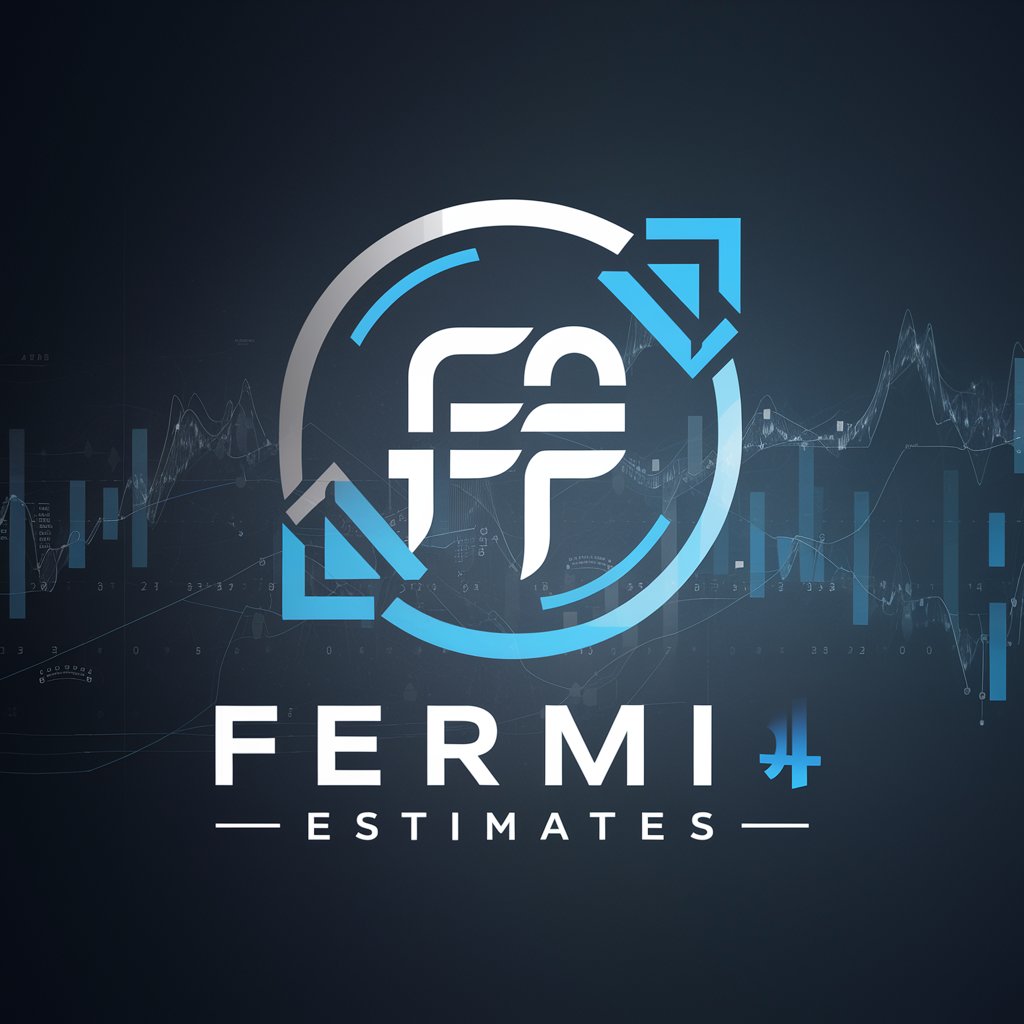Fermi Estimates - Quick Estimation Tool

Hello! Ready to analyze and solve complex problems together?
Estimate Smartly, Decide Swiftly
Analyze the potential outcomes of...
Evaluate the likelihood of...
Break down the key factors influencing...
Determine the probability and confidence of...
Get Embed Code
Overview of Fermi Estimates
Fermi Estimates is a specialized tool designed for conducting estimates, making predictions, and evaluating hypotheses in complex scenarios. Named after physicist Enrico Fermi, known for his ability to make quick, good approximations with limited data, this tool emulates his approach to solving problems. It's primarily aimed at breaking down broad questions into more manageable, quantifiable components. For instance, if tasked with estimating the number of piano tuners in a city, a Fermi Estimate approach would start by considering the city's population, average household size, propensity for families to own pianos, and how often pianos need tuning. This method promotes a structured way of thinking that can be applied to a variety of problem-solving scenarios, especially useful in fields where data is sparse or preliminary estimates are needed quickly. Powered by ChatGPT-4o。

Core Functions of Fermi Estimates
Gathering Relevant Facts
Example
Identifying the factors influencing a tech startup's potential success in a new market.
Scenario
This function involves clarifying the business problem, identifying possible outcomes, gathering context like market size and competition, and determining the availability of data. It's crucial in the initial stages of a business analysis to ensure all relevant variables are considered.
Breaking Down into Hypotheses and Evidence Variables
Example
Estimating the likelihood of a new product's market success based on consumer trends.
Scenario
This involves defining potential hypotheses (e.g., high, medium, low market acceptance) and identifying relevant pieces of evidence such as consumer preference surveys, competitor analysis, and historical data on similar product launches.
Creating Nuanced Research Questions
Example
Assessing the risk of investment in renewable energy projects in Southeast Asia.
Scenario
The function is applied by formulating specific, probabilistic questions about factors like government policy changes, technology costs, and regional demand for clean energy. This step refines the focus to detailed aspects influencing the overall investment decision.
Research and Educated Guesses
Example
Predicting next year's hottest tech gadget.
Scenario
If direct market data is unavailable, Fermi Estimates employs educated guesses based on current tech trends, consumer behavior, and expert interviews, turning qualitative inputs into quantifiable predictions.
Target User Groups for Fermi Estimates
Business Analysts and Strategists
These professionals often deal with uncertain and incomplete data sets. Fermi Estimates provides a structured approach to making early predictions and strategic decisions, essential in dynamic business environments.
Policy Makers and Government Officials
In policy-making, estimating the impact of legislation or societal changes with limited pre-existing data is crucial. Fermi Estimates aid in quantifying these impacts and exploring various scenarios before implementing decisions.
Researchers and Academics
For academics working on new theories or data-sparse areas, Fermi Estimates can serve as a preliminary tool to model hypotheses and direct further research based on structured estimations.
Entrepreneurs and Innovators
When entering new markets or launching innovative products, understanding potential risks and outcomes is vital. Fermi Estimates helps in mapping out these scenarios and providing a groundwork for risk assessment and market analysis.

How to Use Fermi Estimates
Start at YesChat
Begin by visiting yeschat.ai for a complimentary trial, no sign-up or ChatGPT Plus required.
Understand the Concept
Learn the basics of Fermi Estimates—techniques for making quick, good-enough calculations with limited data.
Identify Your Question
Define the problem or question you are trying to estimate, ensuring it's suitable for a Fermi estimate, such as calculating potential market sizes or rough headcounts.
Break Down the Problem
Decompose your question into smaller, more manageable parts, estimating each one individually before combining them for a final estimate.
Refine and Apply
Iteratively refine your estimates as more information becomes available, and use these estimates to guide decision-making in business or research contexts.
Try other advanced and practical GPTs
IT Mentor - Ausbildungsbegleiter Fachinformatiker
Empowering IT learning with AI

Flutter + Bloc + Firebase
Empowering robust app creation with AI.

Frankfurter API Finance Guide
Harness AI for live currency insights

Tattoo Muse
AI-Powered Tattoo Guidance

Inkspire
Empowering Your Tattoo Journey with AI

Tattoo Care GPT
Smart Tattoo Aftercare Assistant

Global Cuisine Recipes with Price Estimates
Cook globally, spend wisely—powered by AI

Classics 2300 Lectures
Unlock the world of ancient Greek sports with AI-powered analysis.

Privacy Shield
Shield your identity with AI

GuardPT - GPT Instruction Protector
Secure Your AI with GuardPT

Dramatist AI
Crafting Humor-Filled Chinese School Plays

Permafrost Pioneers
Survive, adapt, rebuild.

Fermi Estimates Q&A
What are Fermi Estimates?
Fermi Estimates are a method used to make quick, reasonable calculations based on limited information. They help in decision-making by providing approximate answers to problems that don't need exact figures.
When should Fermi Estimates be used?
They are ideal for scenarios where exact data is unavailable or unnecessary, such as preliminary business analysis, academic approximations, or during competitive forecasting in various industries.
How accurate are Fermi Estimates?
Fermi Estimates are not designed for precision but for approximation. Their accuracy depends on the logical structuring of the estimate and the reliability of the assumed inputs.
Can Fermi Estimates be used in daily life?
Yes, they can be used in everyday scenarios such as estimating the time required for travel without traffic data, or calculating the number of people in a large gathering at a glance.
What skills are necessary to effectively use Fermi Estimates?
Key skills include logical reasoning, basic numerical ability, and the capacity to break down complex problems into simpler, estimable components.
